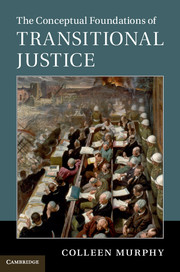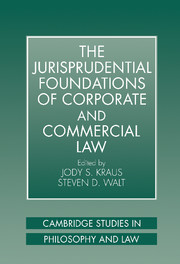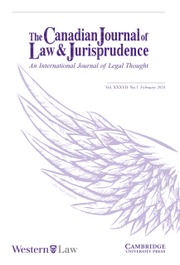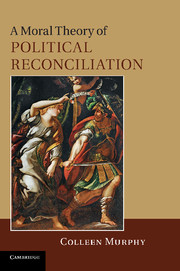The Conceptual Foundations of Transitional Justice
$41.99 (C)
- Author: Colleen Murphy, University of Illinois, Urbana-Champaign
- Date Published: December 2017
- availability: Available
- format: Paperback
- isbn: 9781107449688
$
41.99
(C)
Paperback
Other available formats:
Hardback, eBook
Looking for an examination copy?
This title is not currently available for examination. However, if you are interested in the title for your course we can consider offering an examination copy. To register your interest please contact [email protected] providing details of the course you are teaching.
-
Many countries have attempted to transition to democracy following conflict or repression, but the basic meaning of transitional justice remains hotly contested. In this book, Colleen Murphy analyses transitional justice - showing how it is distinguished from retributive, corrective, and distributive justice - and outlines the ethical standards which societies attempting to democratize should follow. She argues that transitional justice involves the just pursuit of societal transformation. Such transformation requires political reconciliation, which in turn has a complex set of institutional and interpersonal requirements including the rule of law. She shows how societal transformation is also influenced by the moral claims of victims and the demands of perpetrators, and how justice processes can fail to be just by failing to foster this transformation or by not treating victims and perpetrators fairly. Her book will be accessible and enlightening for philosophers, political and social scientists, policy analysts, and legal and human rights scholars and activists.
Read more- Offers a clear analysis of this contested concept
- Draws on the rich interdisciplinary literature on transitional justice, appealing to a broad range of audiences including philosophers, political and social scientists, legal and human rights scholars, and activists and policy analysts
- Provides resources for understanding what should count as success in transitional justice processes
Awards
- Winner, 2017 NASSP Book Award, North American Society for Social Philosophy
Reviews & endorsements
‘Colleen Murphy develops, and delivers, the bold argument that transitional justice - the way a society reckons with massive human rights abuses - is not ordinary justice. It is not reducible to retributive or restorative principles, nor to case-by-case determinations; rather, it is distinctive justice, because it is concerned with the just pursuit of societal transformation and relational repair. Murphy's book is a game-changer: a must-read for anyone concerned with the theory, practice, and policy of post-conflict rebuilding.' Mark A. Drumbl, Transnational Law Institute, Washington and Lee University, Virginia
See more reviews‘Murphy offers an outstanding analysis. This ambitious book constructs a novel way of conceiving the ‘justice' in transitional justice, provoking discussion on a topic that has received little sustained analysis in the burgeoning transitional justice literature.' Margaret Urban Walker, Journal of Global Ethics
'Colleen Murphy’s new book on transitional justice displays her signature blend of analytic rigor, elegant writing, and empirically anchored theorizing. She follows up her excellent first book on political reconciliation with a volume on what it means to transform a war-torn society so that it can, ultimately, become reconciled. The just pursuit of political transformation, Murphy argues, is at the heart of the idea of transitional justice. This is the best, most ambitious philosophical account of transitional justice that I know of. The book can be read with utility by scholars and students seeking to understand the unique conditions and dilemmas surrounding transitions, as well as by policy makers interested in fashioning decent and legitimate transitional institutions.' Nir Eisikovits, Ethics
'In The Conceptual Foundations of Transitional Justice, Colleen Murphy develops a theoretical framework for understanding the conditions, objectives, and processes of transitional justice. It is a very interesting and useful contribution to the literature on transitional justice … the book helps us to rethink how we - practitioners, interested parties, and scholars - can more coherently, effectively, and justly respond to past wrongdoing.' Roger Duthie and David Tolbert, International Center for Transitional Justice
'By reframing justice away from legal accountability and toward the evaluation of legal responses based on their contributions to reforming political relationships, between citizen and state and among citizens, she moves past the increasingly unsolvable debates that have preoccupied the field.' Laurel E. Fletcher, University of California, Berkeley School of Law
'Murphy deserves accolades for traversing numerous disciplinary divides in her approach to transitional justice. For scholars seeking to build more bridges between international law and philosophy, this books offers an excellent way as to how it can be done.' Steven R. Ratner, University of Michigan Law School
'Murphy eloquently argues that transitional justice is not like normal justice; it is qualitatively different because of the fundamentally distinct circumstances that constitute periods of political transition. These include: (a) pervasive structural inequality; (b) normalized collective and political wrongdoing; (c) serious existential uncertainty; and (d) fundamental uncertainty about authority. These background circumstances mean that ordinary ideas of retribution, corrective justice, and restitution do not cater to the needs of societies undergoing transition from authoritarianism/mass violence to democracy/peace. The misfit with these usual concepts of justice is so acute that we must craft an entirely new, distinct brand of justice that follows its own logic and answers to its own self-consciously defined first principles.' James Stewart, University of British Columbia
'… the book is a sophisticated and analytic account of a timely topic, and merits a careful read by those with an interest in the challenges of transitioning from injustice to justice in circumstances that make the transition, without good guidance of the kind Murphy offers, seem impossible to achieve.' Patti Lenard, Notre Dame Philosophical Reviews
'Murphy’s accessible and engaging book provides a normatively clear and philosophically rigorous theory of transitional justice that is a valuable contribution to a burgeoning literature on a complex moral and political subject. … its clarity helps to illuminate where future philosophical work on this complex theme should go.' Catherine Lu, Criminal Law and Philosophy
‘This book will be very useful to those who are interested in post-conflict rebuilding, conflict transformation, and reconciliation. The author asks us to reconsider conventional ideas about transitional justice and to focus on the role that relational change can play in it. Although Murphy’s research needs to be fully contextualized to establish its relationship with ideas explored in other relevant literature, this book will help theorists and practitioners to comprehend the complex yet unsolved relation between 'doing justice' and 'social transformation' in transitional societies.’ Kang Hyuk Min, Journal of Conflict Transformation and Security
‘The Conceptual Foundations of Transitional Justice advances this work in important ways, by developing a bold case for the importance of transitional justice. The book is a rewarding intellectual journey, and offers a provocative framework for transforming theory and practice.' Bronwyn Leebaw, Perspectives on Politics
Customer reviews
Not yet reviewed
Be the first to review
Review was not posted due to profanity
×Product details
- Date Published: December 2017
- format: Paperback
- isbn: 9781107449688
- length: 231 pages
- dimensions: 230 x 153 x 12 mm
- weight: 0.35kg
- availability: Available
Table of Contents
Preface
Introduction
1. Circumstances of transitional justice
2. The problem of transitional justice
3. Societal transformation
4. The just pursuit of transformation
Conclusion.
Sorry, this resource is locked
Please register or sign in to request access. If you are having problems accessing these resources please email [email protected]
Register Sign in» Proceed
You are now leaving the Cambridge University Press website. Your eBook purchase and download will be completed by our partner www.ebooks.com. Please see the permission section of the www.ebooks.com catalogue page for details of the print & copy limits on our eBooks.
Continue ×Are you sure you want to delete your account?
This cannot be undone.
Thank you for your feedback which will help us improve our service.
If you requested a response, we will make sure to get back to you shortly.
×





